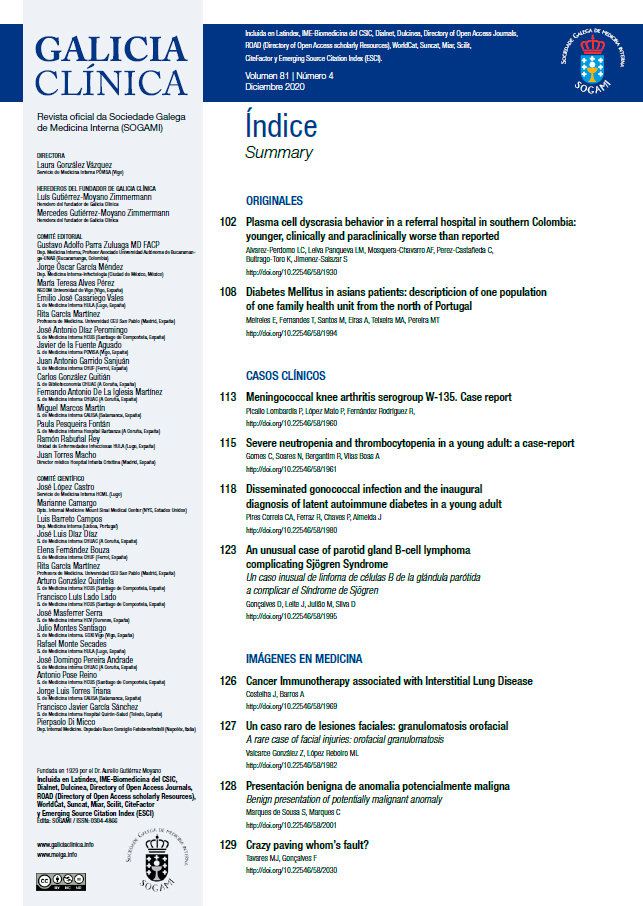Galicia Clínica by Sociedad Gallega de Medicina Interna is licensed under a Creative Commons Reconocimiento-NoComercial-SinObraDerivada 4.0 Internacional License.
Created from galiciaclinica.info.
Similar Articles
- Luis Carlos Afonso Rocha, Cecília Moreira, Filipe Breda, José Presa, NAVIGATING IPILIMUMAB-INDUCED HYPOPHYSITIS IN ADVANCED HEPATOCELLULAR CARCINOMA: A CLINICAL PERSPECTIVE , Galicia Clínica: Vol. 85 No. 4 (2024): Galicia Clinica - Official Journal of the SOGAMI
- Marta Araújo Morgado Vilaça, Helena Magalhães, Fernanda Estevinho, Main structural oncologic emergencies in lung cancer: a single center analysis , Galicia Clínica: Vol. 82 No. 4 (2021): Galicia Clinica - Official Journal of the SOGAMI
- Ana Mondragão, Silvia Costa, Marta Barbedo, Vitor Paixão Dias, Liver metastasis of a primary hard to find… , Galicia Clínica: Vol. 78 No. 4 (2017): Galicia Clinica - Official Journal of the SOGAMI
- Alícia da Silva Oliveira, Emílio Macias Bravo, Bullous dermatitis as an adverse reaction to pembrolizumab , Galicia Clínica: Vol. 83 No. 1 (2022): Galicia Clinica - Official Journal of the SOGAMI
- Helena Temido, Manuel Oliveira-Santos, Francisco Parente, Armando Carvalho, Supraclavicular lymphadenopathy as initial presentation of prostate cancer , Galicia Clínica: Vol. 79 No. 1 (2018): Galicia Clinica - Official Journal of the SOGAMI
- Fernando Freitas Gonçalves, Penélope Aguiar Almeida, Margarida França, Portal vein thrombosis as presenting feature of localized gastric adenocarcinoma , Galicia Clínica: Vol. 79 No. 4 (2018): Galicia Clinica - Official Journal of the SOGAMI
- MT. García Sanz, F.J. González Barcala, J. Varela Durán, Epidemiología de cáncer colorrectal en el Área Sanitaria del Salnés. Análisis de 5 años , Galicia Clínica: Vol. 70 No. 1 (2009): Galicia Clinica - Official Journal of the SOGAMI
- S. Zhilina, M. Fernández, Hypertrophic osteoarthropathy in patient with epidermoid lung cancer , Galicia Clínica: Vol. 74 No. 1 (2013): Galicia Clinica - Official Journal of the SOGAMI
- Ana Raquel Costa Afonso , Joana Urbano , Skin lesion of the thigh as a metastatic expression of breast neoplasia. , Galicia Clínica: Vol. 84 No. 4 (2023): Galicia Clinica - Official Journal of the SOGAMI
- Francisco Cunha, Nuno Teixeira-Tavares, Drug-induced toxic Myocarditis: Doxorubicin once again leading to Heart Failure , Galicia Clínica: Vol. 77 No. 2 (2016): Galicia Clinica - Official Journal of the SOGAMI
You may also start an advanced similarity search for this article.
Most read articles by the same author(s)
- João Costelha, Artur Barros, SUBCORNEAL PUSTULAR DERMATOSIS OF SNEDDON-WILKINSON , Galicia Clínica: Vol. 81 No. 3 (2020): Galicia Clinica - Official Journal of the SOGAMI


